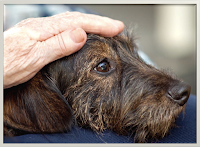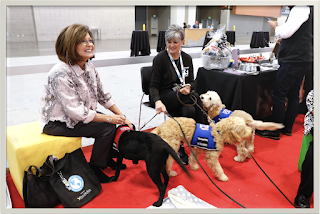Therapy dogs have been working in the US since the 1960s, according to the Alliance of Therapy Dogs. “Animal Assisted Therapy” became an actual recognized practice in 1989, although any pet owner will tell you that simply petting a dog or cat can help calm and balance a person’s disposition.
 |
| Courtesy AKC |
Science has shown that petting a dog has physiological effects. It can reduce stress and anxiety by helping raise a person’s levels of dopamine, serotonin, and oxytocin. Dogs put most people at ease. They can sense when a person is unhappy and grieving, and provide comfort and unconditional love to those in need. And dogs sense who needs them most.
Since the turn of the 21st century, funeral homes have been offering clients the comfort and companionship of grief therapy dogs. The National Funeral Directors Association (NFDA) reports that more than half of their clientele are interested in having a therapy dog present at a funeral or memorial service.
While the NFDA doesn’t keep track of the number of funeral homes that have working therapy dogs, it is steadily rising as the public learns to understand and accept therapy dogs in everyday life.
Grief therapy dogs come in all shapes and sizes. The most popular are Labradors, Labradoodles, Golden Retrievers, and Golden Doodles. But other breeds, even mixed breeds are acceptable, if trained correctly.
A funeral home grief therapy dog is usually owned by the funeral director, or another member of the staff. But before joining the staff, a therapy dog must be trained.
 Ultimate Canine is one of the best training services for therapy dogs. Located
near Indianapolis Indiana, the company is owned by Julie Case, who has been
training dogs for nearly 30 years. Her company helps with the selection of the
dog, the actual training, and certification for therapy dogs. And, there are courses for handlers.
Ultimate Canine is one of the best training services for therapy dogs. Located
near Indianapolis Indiana, the company is owned by Julie Case, who has been
training dogs for nearly 30 years. Her company helps with the selection of the
dog, the actual training, and certification for therapy dogs. And, there are courses for handlers.
According to the American Kennel Club (AKC), there is a checklist for therapy dogs working in funeral homes.
Some key points include being able to tolerate excessive petting, willing to sit on laps, or placing head on knees for extended periods of time. The dog shows no signs of stress, and can “work the room,” seeking out those who need them.
A grief therapy dog is trained in the art of comfort. The dog knows how to approach different people. While one person might simply need the dog laying by their feet, others would welcome a head in the lap, or a paw on the knee. Therapy dogs sense who would welcome more interaction and offer it. They are comfortable being held and cried on. Many times, people talk to the dogs, sharing things they would not be comfortable voicing to others.
They also provide a distraction, especially for children who may not fully understand what is happening, or who have bottled up their feelings. When the dog comes over and lays on the child’s feet, that usually opens the feelings, and kids will cry into the dog’s fur as they begin to get in touch with their feelings.
Funeral homes check with family to see if they want a therapy dog present during the visitation, funeral, or memorial service. Visitors are notified by a small sign at the door that indicates the family has requested a therapy dog be present.
 | |
| Courtesy Ultimate Companion |
Therapy dog owners always watch for signs of stress in therapy dogs after long interaction with those grieving. By visiting schools, nursing homes and other establishments, the dogs get a chance to reset and get ready for another day to share their unconditional love and comfort at the funeral home.
~ Joy

















